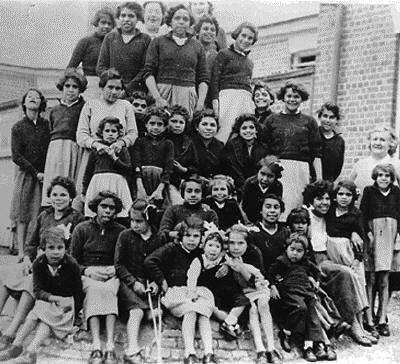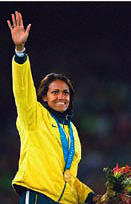Christian Living Stories: A Place Where Everybody Belongs
An historic event occurred in Australia on February 13. Prime Minister Kevin Rudd opened Parliament with a bi-partisan motion of apology on behalf of the nation to the indigenous people of his country.
His apology was given in particular to what has become known as the Stolen Generations — Aboriginal and Torres Straits Islander children whom the government forcibly removed from their families in a misguided attempt to integrate them into society at large. Children were thrust into institutions, interment camps, orphanages or into white foster families far from their homes and culture. This tragic policy was in force for generations — stolen generations — beginning in the mid 1800s and lasting until 1970.
 “Reconciliation is where everyone feels acknowledged, welcome, accepted, needed and valued — where everyone’s story is important.” |
Prime Minister Rudd’s apology became, in effect, a National Day of Reconciliation for Australians. The Prime Minister said the apology was about the past and the future — removing the “stain on that nation’s soul” that government policy, even if well intentioned by the standards of the times, had caused. It was an essential step in the healing of the nation and going forward together into the future. Acknowledging the national desire for reconciliation, he said the apology was the beginning of a new chapter in Australia’s history.
A sorry story
If individual relationships are complex, sometimes difficult, fraught with opportunities for misunderstanding and misperception, imagine such complexities on a national scale. Why should the current generation say sorry for the sins of the past? Weren’t some of the past actions committed with the best of intentions? According to senior journalist Paul Kelly, the apology “is an essential act of contrition and a uniquely confessional event for Australia’s soul.”
The complexities, nuances and debates are many. But cutting through to the heart of the matter is the essential element of human dignity, respect and care.
“The Stolen Generations are not intellectual curiosities — they are human beings, human beings who have been damaged deeply by the decisions of governments and parliament,” Rudd said.
Olympic gold-medal-winning athlete Cathy Freeman, whose own family has experienced the effects of the Stolen Generations (see box), captured the spirit of the apology before it was given when she said, “The apology is essential, and it is the right thing to do. Saying sorry is like opening a space for us all to become unified. If we as a nation are going to move forward, the best way is together.”
A bridge of respect
Jenny Macklin, the indigenous affairs minister, said recently that the way forward is to tackle the prevailing problems in the community, such as the massive gap in life expectancy between Aborigines and the rest of Australia’s population. “The point of the national apology really is to provide a bridge of respect between indigenous and non-indigenous Australians,” she told Sky News Australia.
The importance of this step is hard to exaggerate. A greater respect is all many people are asking for, but greater respect is also the first step to opening and sustaining meaningful and constructive dialogue. Saying “sorry” isn’t the end of the matter; it is more the start of an on-going process of engagement and action to deal with emotional, mental and physical problems that were caused by the government policy of separation.
Acknowledgment and true appreciation of others cost nothing economically. They do sometimes cost us our ego. We do sometimes have to admit we’ve made mistakes. And that requires a genuine humility.
It’s one thing to acknowledge that differences exist. It’s a big leap to respect those differences and to do what is possible to right the wrongs. Genuine respect opens the way to truly valuing those differences in ways that allow us to work together in harmony and hope.
The soul of a nation
Cathy Freeman is one of the many national figures who affirmed the value of an official apology to the Stolen Generations. More than 2 billion people with a TV watched her light the cauldron at the opening of the 2000 Olympics in Sydney, Australia, become the 400 metres gold medallist, and then do a proud victory lap with both the Aussie and aboriginal flags. It was a euphoric moment, a proud nation united in her achievement: “the world at her feet and the soul of a nation on her back.”
Cathy Freeman is also one of many Australians whose Aboriginal forebears were forcibly removed from their homes as babies. Freeman is frank about her disgust over what has become known as the “stolen generations,” but says that an apology by Parliament will represent a healing for her family.
Cecilia Barber, Cathy’s mother, was born on Palm Island, off Townsville, northern Queensland. Cathy was taken from her mother and placed in a church-run dormitory. She said, “I will never really understand what it is like for a mother to have to protect her child and being unable to do it. It was disgusting. Horrible.”
A landmark report in 1997 established that every indigenous family between 1910 and 1970 was affected by forcible removal of children under assimilation policies. They were placed in orphanages run by churches or charities or fostered out to be integrated into European culture.
In Australia, Cathy is an emerging champion and role model of racial reconciliation. She’s also a realist. In a recent episode of Who Do You Think You Are?, Cathy explored her family history, which inevitably uncovered some of the colonial abuses at the heart of this apology. She became emotional, shed some tears, and then with gracious calm spoke about what we can all do in the here-and-now no longer hampered by the there-and-then.
Response
On the eve of the apology, one aboriginal elder put it like this: “Sorry is about forgiveness, and forgiveness is about love.”
The apology brought back many painful memories and produced many mixed emotions. Notwithstanding the reality that not everyone supported the idea across the nation, there was nevertheless an atmosphere of rejoicing, hope and celebration that saying sorry opened a space for reconciliation, a space from which we could together forge a new and better way forward.
Tom Calma, the Social Justice Commissioner, responded to the speeches in parliament on behalf of the people of the Stolen Generations by saying that ultimately it was not about guilt and blame so much as it was about belonging. He said that to him personally it was about having open hearts and open minds, listening and understanding, and treating one another with respect. He acknowledged that it was far easier to divide than unite. And echoing the Prime Minister, he said that the way forward is to offer the hand of friendship, not to proceed with closed fists.
Reconciliation, he said, is where everyone belongs — where everyone feels acknowledged, welcome, accepted, needed and valued — where everyone’s story is important; where everyone’s story contributes to the greater story.
In achieving progress to a point “where we all belong,” saying sorry is the right and necessary thing to do.
Way forward: fair go, mate
Saying sorry has already unleashed a flood of positive emotions and good will. It’s a matter of “sorry” reflecting a national change of heart, a reconciliation that results in practical national measures that produce real improvement in the lives of indigenous Australians.
As Rudd said, in endeavoring to never repeat the mistakes of the past, the future needs to be built on mutual respect, mutual resolve and mutual responsibility.
A combined “war cabinet” approach that transcends political parties has begun. Goals are set. Australians are realizing we are not just saying “sorry” for the past, but acknowledging our own current responsibility in the present state of affairs. We all have a responsibility to work together to resolve the issues.
Kevin Rudd stated that a “fair go for all” was an expression of a core Australian value. Indigenous Australians folks haven’t been given a fair go in the past. It’s time to fix that by working together.
In a place where everybody belongs.
Author: John McLean and Kerry Gubb

